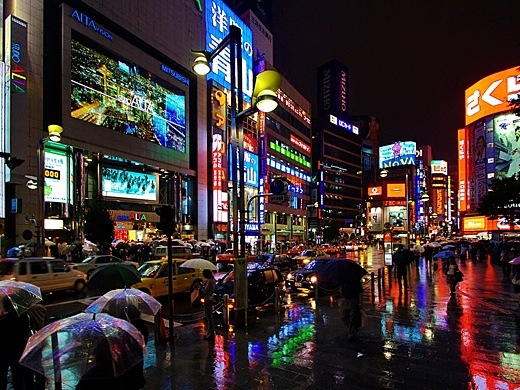 Image above: Shinjuku district of Tokyo on a rainy night.
From (http://wallpaper-s.org/63__Shinjuku_at_Night%2C_Tokyo%2C_Japan.htm)
Image above: Shinjuku district of Tokyo on a rainy night.
From (http://wallpaper-s.org/63__Shinjuku_at_Night%2C_Tokyo%2C_Japan.htm)
By Guy McPherson on 3 February 2010 in Nature Bats Last - (http://guymcpherson.com/2010/02/city-living-in-a-post-peak-world)
This headline at today’s version of Energy Bulletin caught my eye: Are cities sustainable in a post-peak oil world?
The editors at Energy Bulletin, reflecting contemporary culture, clearly do not understand sustainability. At every level, from the individual through the culture and even through the species, ours is a transient existence. We should be focused on developing a durable set of living arrangements in the few blinks we have between trips from and to the void. We should not waste our time chasing the impossibility of sustainability, regardless of corporate green-washing to the contrary.
But enough about that particular pet peeve. If you follow the headline’s link, you’ll land at a set of five articles excerpted from longer articles by five authors. Each article discusses the prospects of surviving in the post-carbon era.
As you can imagine, that takes me to yet another pet peeve. We should be developing a set of living arrangements focused on thriving, not merely surviving. If I believed the future was truly Hobbesian, I’d simply save a bullet for myself.
Well, maybe two. I’ve never been a very good shot.
And finally, the focus of the headline, as well as the tone of the articles, ignores a central tenet of this blog: morality. The focus on survival at the expense of consideration of the immorality of cities is not surprising. Imperialists are loath to consider the morality of empires, so our national conversation rarely turns to morality beyond the hand-wringing of what to do with a person for an individual act.
The larger and considerably more important issue of how industrial culture destroys people from every non-industrial culture as well as the living planet simply escapes the attention of Faux News (the most-trusted network in the U.S., according to this poll). Cities are the very apex of imperial living, and they function only by extracting resources from surrounding areas in exchange for various forms of waste. But cities are embedded within, and emblematic of, industrial culture, which apparently is beyond our ability to discuss. As should be clear, reasons to abandon cities extend far beyond survival, as I’ve described repeatedly (recent examples can be found here, here, here, here, and here).
Maybe I’m just peevish today.
Toby Hemenway is the most adamant defender of city living. Writing in 2005, he concluded that we’re in for a long descent. But, as became clear at least five times during 2008 and 2009, industrial culture can reach its overdue close quite abruptly. Simply because it didn’t happen yet — saved by unprecedented illegal actions by the federal government — doesn’t mean it cannot happen. Peter Goodchild posts the definitive warning with this line: “Those who expect to get by with ‘victory gardens’ are unaware of the arithmetic involved.”
.
No comments :
Post a Comment